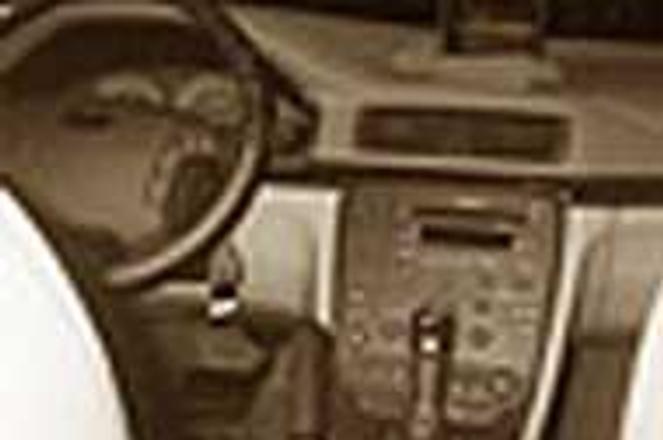Volvo now produces cars with navigations and televisions for the driver who needs it all.photo: Chris Togneri
Cars, once used only as a means of transportation, are rapidly evolving into a complete technological entertainment and computer system. What started out with AM radio has escalated into CD systems, car phones and anti-police radar. Now, according to a collection of western companies, the newest toys for cars are satellite-operated navigation systems and televisions.
While Škoda and analysts insist that the new technology is a western fad, saying that Slovaks will neither desire it nor be able to afford it, western car producers say that they believe the advancements are the next step in automotive transportation technology and add that some consumers have had no problem shelling out up to 400,000 Sk ($10,000) for computerised extras.
"We sell quite a few navigation systems," said Mercedes-Benz representative Lucia Mišíková. "They're great- they help us sell cars and they are especially good for people who travel to Austria a lot. People who buy bigger cars usually won't buy them without a navigation system."
On April 13, the car exhibition Autosalon opened at Incheba Exhibition grounds in Bratislava. For the more than thirty car companies exhibiting their merchandise, the car gathering was an excellent opportunity to show off new lines and technologies such as navigation systems, participants said.
Swedish car-producer Volvo offers self-manufactured navigation systems and car televisions for "around 350,000 to 400,000 crowns," said Volvo salesman Vladimír Karovič. According to Karovič, the navigation systems transmit frequencies under the GPS system with a satellite 300 kilometres above the earth's surface which allow the driver to locate and view a pre-determined destination with great accuracy on the screen. Or, they can just check out what's on television.
"The RTI (Road and Traffic Navigation System) can be viewed on this screen which emerges from the dash-board," he explained during an demonstration for The Slovak Spectator. As Karovič spoke, he flipped through the local TV stations, eventually stopping on TV Markíza. "If you are travelling in, for example, Austria, you simply insert the CD that covers all of Austria, Switzerland, and Italy - including the cities - and the map of your location is shown on the screen."
The cost of this Volvo car trunk satelite receiver is about $10,000. TV reception is included in the price.photo: Chris Togneri
"If you want to find a Holiday Inn," he added, "the system can locate one for you plus or minus ten metres."
Ľubomír Šikula, sales manager for the Bratislava-based Lexus office, said that that some of his company's models are almost exclusively sold with navigation systems. "In terms of luxury sedans, almost one hundred percent are sold with the systems," he said. "Some of the other models have, say, a fifty percent ratio."
Šikula said the Japanese car-maker, which also produces Toyota, sells the navigation systems "starting at 40,000 crowns for Toyotas and 200,000 crowns for the Lexus models."
Although satisfied with current sales on the Slovak market, western car-producers did note an obstacle retarding sales growth. While navigation systems can currently be purchased in Slovakia, a CD-ROM providing maps of Slovakia has not yet been produced.
"[Manufacturers] promised one would already be made by now, but... it hasn't been," Mercedes-Benz's Mišíkovásaid. "It's hard to say when it will be made."
Representatives of Brirish car-maker Jaguar also said that they had been waiting for a Slovak CD-ROM, but said that they expected one to be available within a year or two. They added that when the software would be made available, Slovak sales for car navigation systems would increase dramatically.
"Last summer manufacturers said that a CD containing Slovak and Czech maps would be ready, so maybe this summer we'll see it," Lexus's Šikula said.
"It (the CD-ROM) is only for western countries right now without available maps for Slovakia and the Czech republic," added Volvo's Karovic. "But, eventually I think that the system will become quite popular in Slovakia."
However, Czech car-producer Škoda, which commands a dominating 40% of the Slovak car-sales market, did not share Volvo's optimistic attitude towards what they deemed as "unnecessary" navigation systems and television access. According to Škoda representatives at Autosalon, the packages currently available from western car companies are not an option for Slovak consumers and will not be in the foreseeable future.
"Next year Škoda will probably begin producing cars with navigation systems, but not for the Slovak market. Cars produced with the systems will all be exported," said Škoda marketing representative Ilja Majda. "Slovakia is a small country, and Slovaks just don't need navigation systems."
Martin Buschbacher, a reporter for car magazine Automotor a Šport agreed with Škoda that hi-tech navigation systems would never make headway in the Slovak market and added that Škoda's decision to not produce the costly systems for Slovaks was shrewd.
"Slovakia's road systems are not difficult to figure out," he said. "Navigation systems will be popular, but only for those who travel abroad."
Martina Pisárová
contributed to this story.


